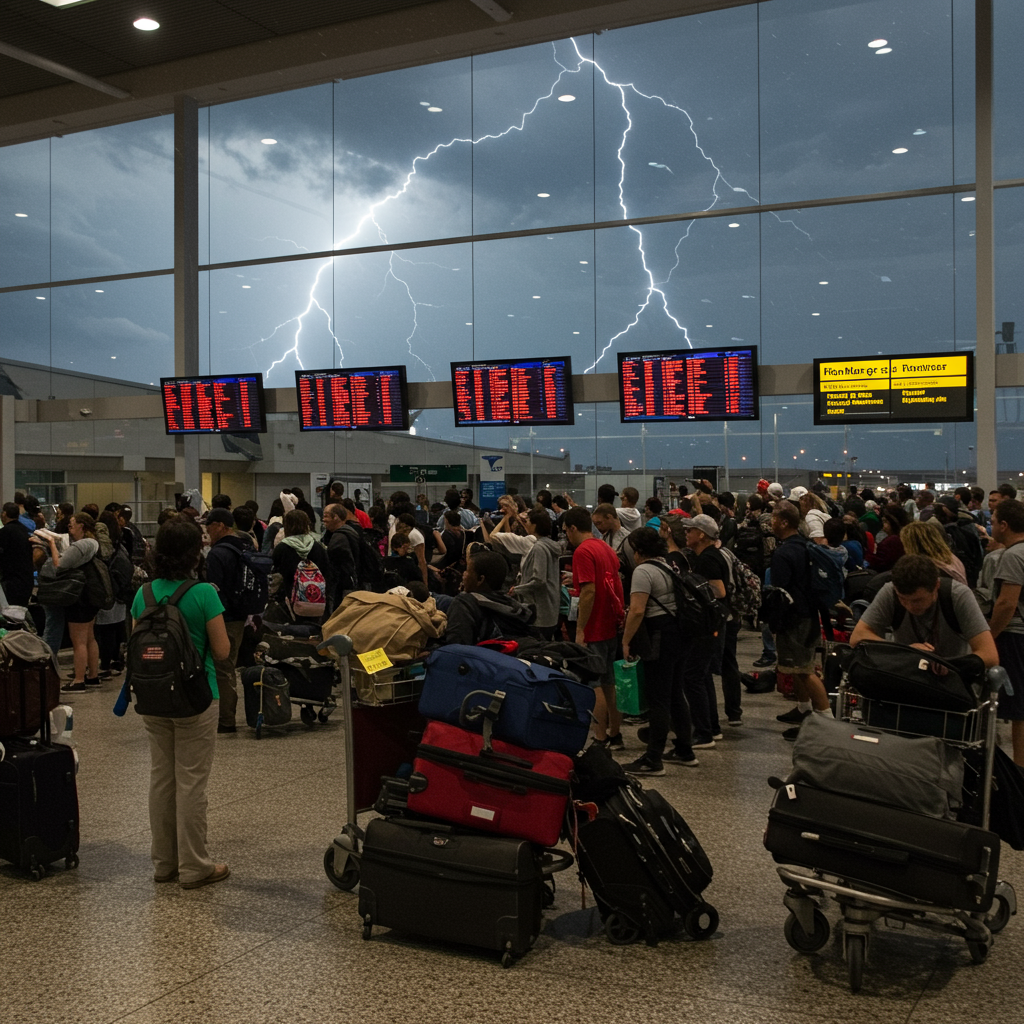A powerful severe thunderstorm unleashed chaos at Hartsfield-Jackson atlanta International Airport (ATL) Friday evening, forcing a rare evacuation of the air traffic control tower and triggering widespread flight disruptions just as the critical Fourth of July holiday travel weekend began. Thousands of passengers faced significant delays, cancellations, and diversions at one of the world’s busiest aviation hubs.
The sudden and intense weather event, which included lightning, hail, and damaging winds, brought air traffic operations at ATL to a near standstill. The Federal Aviation Administration (FAA) confirmed that strong winds necessitated the temporary evacuation of most personnel from the control tower, a critical piece of infrastructure for managing the massive volume of air traffic flowing in and out of Atlanta daily.
Dramatic storm Rocks Atlanta Airport Operations
The storm front descended upon metro Atlanta Friday evening, bringing not only severe weather conditions to the airport but also triggering flash flood warnings across parts of the region. The timing couldn’t have been worse, coinciding directly with the anticipated surge in travel for the long Fourth of July weekend.
Hartsfield-Jackson Atlanta International Airport is an absolute cornerstone of global air travel, handling over 100 million passengers annually and frequently ranking among the busiest airports worldwide. It serves as the primary hub for Delta Air Lines, managing around 900 daily flights from the location alone. Disruptions here have immediate ripple effects across the entire national, and even international, aviation network.
Air Traffic Control Tower Evacuation: The Critical Moment
The most dramatic impact of the storm was the mandatory evacuation of the airport’s air traffic control tower. The tower, which is the tallest in North America, is staffed by FAA controllers who guide aircraft safely through the complex Atlanta airspace. During the height of the storm, strong winds reportedly became a major factor, leading to the decision to evacuate non-essential personnel.
While most controllers were temporarily moved from the facility, the FAA stated that a minimal crew remained in the tower. These few controllers continued to manage inbound aircraft to the extent possible under the challenging conditions, ensuring a basic level of communication and guidance for planes already approaching the airport. The airport spokesperson, Tim Turner, confirmed that only two controllers remained during the ground stop to maintain essential communications. Operations at the tower have since resumed normal functions following the storm’s passage.
Chaos in the Sky and on the Ground: Flight Impacts
The combination of severe weather, a temporary ground stop, and reduced air traffic control capacity had an immediate and devastating impact on flight operations. The effects were felt both in the air, with planes diverted, and on the ground, with departures halted and arrivals facing significant holding patterns.
Widespread Delays and Cancellations Reported
The numbers tell a stark story of the disruption. Flight tracking site FlightAware reported massive impacts by Friday evening and into Saturday. Over 470 flight cancellations and nearly 560 delays were recorded at ATL alone. By early Saturday afternoon, this figure for cancellations had reportedly risen to over 450 flights canceled for Saturday as a result of the previous day’s storm.
The FAA’s own data reflected the scale of the issue. At one point, departure delays were increasing and ranged from 16 to 30 minutes, while airborne arrival delays averaged a staggering 1 hour and 15 minutes. All inbound flights were held at their departure airports, unable to head towards Atlanta until at least 12 a.m. EDT Saturday.
Airlines Grapple with Storm’s Aftermath
As the largest operator at ATL, Delta Air Lines bore the brunt of the storm’s impact. The airline reported over 90 flight diversions due to the adverse weather conditions on Friday night. By Saturday afternoon, the effects on Delta’s network were significant, with 14% of its total flights across its system canceled.
Other carriers operating at ATL also experienced considerable disruptions. American Airlines, Endeavor Air (a regional affiliate of Delta), and Frontier Airlines all faced multiple delays and cancellations as a result of the storm’s impact on the Atlanta hub.
Hail Damage Adds Another Layer of Complexity
Beyond the immediate challenges of wind and limited air traffic control staffing, the storm introduced another significant hurdle: hail. Quarter-inch hail fell at the airport, necessitating safety inspections on affected aircraft before they could be cleared for flight.
Delta confirmed that over 100 of its aircraft required inspection specifically due to potential hail damage. This mandatory process added further delays to the recovery effort, grounding planes that might otherwise have been used to catch up on the backlog of flights. Delta’s maintenance teams worked diligently through the night and into Saturday morning to complete these critical inspections.
Navigating the Disruption: Advice for Travelers
With operations struggling to return to normal, authorities and airlines urged travelers to stay informed. Given the potential for ongoing delays and cancellations, particularly through Saturday and into the remainder of the weekend, proactive communication was essential.
Travelers were advised to monitor the FAA’s airspace status page for general updates on nationwide air traffic flow. More importantly, passengers were strongly encouraged to use their specific airline’s mobile applications and websites for real-time updates regarding their individual flight status. These platforms often provide the most current information on delays, cancellations, and potential rebooking options. Rebooking through the app can often be faster than waiting in line or calling customer service during peak disruption.
Holiday Travel Season Amplifies Impact
The severe weather event occurred precisely as the busy Fourth of July holiday travel period commenced. AAA had projected millions of Americans would fly during this period, with Atlanta’s airport anticipating handling over 4 million passengers between June 28 and July 6 alone. Friday, the day the storm hit, was expected to be exceptionally busy, with nearly 400,000 passengers forecast to pass through ATL.
The timing of the disruption during such a high-volume period significantly exacerbated its impact. The sheer number of travelers and flights meant that even a temporary setback like the tower evacuation and ground stop created a massive backlog that would take considerable time and effort to resolve.
Looking Ahead: Recovery Efforts Underway
Delta and other airlines acknowledged the significant disruption caused by the storm and apologized to affected customers. Airline personnel were working as safely and quickly as possible to recover operations, but the scale of diversions, cancellations, and aircraft inspections meant that the recovery would not be immediate.
Delta specifically warned that delays and cancellations were anticipated to continue into Saturday morning and potentially throughout the weekend. This ongoing disruption is necessary for tasks like repositioning aircraft that were diverted and ensuring flight crews meet mandatory rest requirements following the operational chaos. While the FAA indicated the storm would not cause long-term capacity issues, the immediate consequences are substantial, highlighting the complex challenges of restoring a massive hub’s schedule after a major weather event during peak travel time.
Frequently Asked Questions
Why was the air traffic control tower at Atlanta’s airport evacuated during the storm?
The Federal Aviation Administration (FAA) stated that strong winds associated with the severe thunderstorm prompted the evacuation of most personnel from the Hartsfield-Jackson Atlanta International Airport control tower on Friday evening. While most controllers evacuated for safety, a small crew remained in the tower to manage essential communications and handle incoming aircraft.
How many flights were delayed or canceled at Atlanta’s airport due to the storm?
The severe storm led to widespread flight disruptions. According to FlightAware data, over 470 flights were canceled and nearly 560 flights were delayed at ATL on Friday evening. By Saturday afternoon, more than 450 additional flights had been canceled as recovery efforts continued following the storm.
What should travelers flying through Atlanta do if their flight was impacted by the storm?
Travelers affected by the storm disruptions are advised to monitor their flight status closely. The best way to get real-time updates and explore rebooking options is through their specific airline’s mobile app or website. Checking the FAA’s airspace status page can also provide general context about ongoing conditions.




